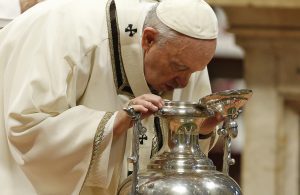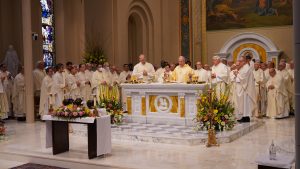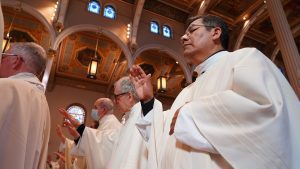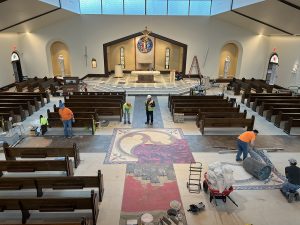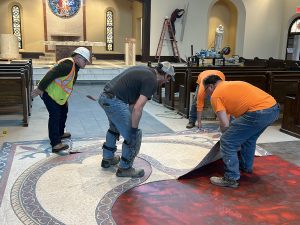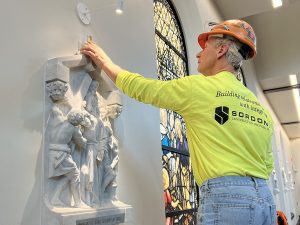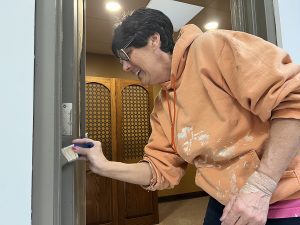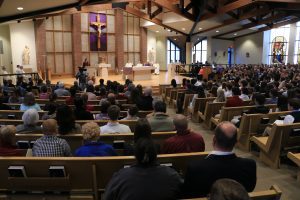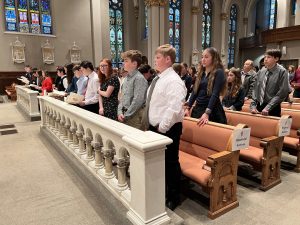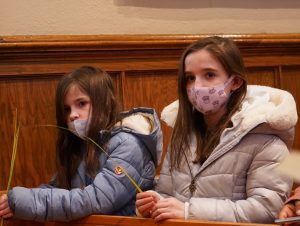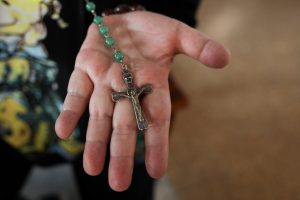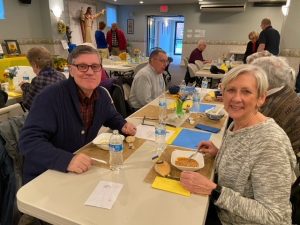
Dear Friends,
Two years ago during these sacred days of Lent, Holy Week and Easter, our world turned upside down. A strange virus invaded our lives in a way that none of us had ever before experienced nor could have imagined. Life came to a standstill and even our churches closed their doors as we sought to protect one another from the virus’ deadly grip.
In the face of such obstacles, we held on desperately to our faith, confronting the message of Good Friday and the Cross of Jesus like never before. As we struggled to discover the blessings of Easter, the pain, uncertainty and fear of those days eventually gave way to the life and hope won for us through Christ’s Resurrection.
Today, as we find ourselves at last emerging from the darkness of a global pandemic, our world is still turned upside down as our brothers and sisters in Ukraine suffer the ravages of war. This time, however, the source of our global concern is not an unknown virus. The source of this war, and others like it, is an all too familiar scourge rooted in sin – in pride, envy, greed and the absence of any fear of God that has led to a blatant disrespect of human life made in the image and likeness of the same almighty being.
As we have done countless times before in the face of suffering and pain, these sacred days beckon us to turn to the only place that enables our broken world and lives to find forgiveness, healing, hope and peace: the Paschal Mystery – the Easter miracle – the promise won for us through the suffering, death and resurrection of Jesus!
Pope Francis so providentially spoke to the ongoing struggles that continue to confront our world in his Easter message shared a year ago.
The Holy Father said, “In the midst of this complex reality, the Easter message speaks concisely of the event that gives us the hope that does not disappoint: ‘Jesus who was crucified has risen.’ It speaks to us not about angels or ghosts, but about a man, a man of flesh and bone, with a face and a name: Jesus. The Gospel testifies that this Jesus, crucified under Pontius Pilate for claiming he was the Christ, the Son of God, rose on the third day in accordance with the Scriptures, just as he had foretold to his disciples … In so doing, Jesus took upon himself our weakness, our infirmities, even our death. He endured our sufferings and bore the weight of our sins … His wounds are the everlasting seal of his love for us. All those who experience a painful trial in body or spirit can find refuge in these wounds and, through them, receive the grace of the hope that does not disappoint.”
Brothers and sisters, for all that we have experienced throughout the journey of our lives, the grace of God, indeed, does not disappoint! And that grace abounds through the presence of the Risen Jesus dwelling in the hearts of his disciples – all of us who have been baptized into his life, death and resurrection. In countless numbers of ways, your openness to the love and mercy of God has enabled you to give hope to many – from the care that you have offered to those burdened by the pandemic, to your material support of those suffering because of the war in Ukraine, to your daily efforts to build up your parishes and to proclaim the gospel message through your words and especially your gestures of love and service.
One of the greatest signs of the grace of God at work in our world is the presence of those who have responded to the Lord’s call and opened their hearts to the life giving waters of Baptism and a determination to walk in the footsteps of Jesus. On Holy Saturday night, 107 catechumens and candidates from throughout the Diocese of Scranton will be baptized into the life, death and resurrection of Jesus and presented for full communion in the Catholic Church. These catechumens and candidates – our relatives, neighbors and friends – join with tens of thousands of catechumens and candidates from around the world to publically profess their faith in Jesus Christ and to assume their place in his body, the Church. Their lives and faith affirm the reality of the living God continually working in and through his sons and daughters.
During this Holy Week, I pray that we will all come to appreciate more deeply than ever the fact that we are indeed blessed in more ways than we might believe or imagine. May we trust in God’s promise to sustain us and dispel our deepest fears. And may we open our hearts to the risen Jesus and allow him to fill them with his love and peace.
This is the day that the Lord has made. Let us rejoice and be glad!
Faithfully yours in the Risen Christ,
Most Reverend Joseph C. Bambera, D.D., J.C.L.
Bishop of Scranton

